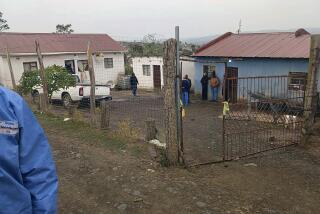15 Supporters of ANC Massacred in South Africa
JOHANNESBURG, South Africa — Less than 10 weeks before this country’s first free elections, political violence intensified dramatically Saturday with the massacre of 15 people, most of them teen-agers, who had been preparing for a voter education workshop.
All the victims were supporters of Nelson Mandela’s African National Congress, ANC officials said. Political bloodshed is common here, but the slaughter in strife-torn Natal province appears to be the worst single attack on a political group since the formal election campaign began last month to end more than three centuries of white minority rule.
Police said four unidentified men armed with AK-47 assault rifles and homemade guns blasted a hut in rural Mahele where the group was sleeping, and then hacked at the bodies with knives. At least three victims died trying to flee the attack. Twelve of the dead were under the age of 18, police said.
A local ANC official, Zabuse Mlaba, said the group had put up posters Friday in preparation for a voter education program for local residents. “Those who don’t want people to vote” were responsible, he said.
Police initially released few details. “I can say it is political, but I don’t want to elaborate further,” said local police commander Ben Lombard.
Hernus Kriel, the minister of law and order, said in a statement that the massacre “was yet another indication that levels of political intolerance and intimidation have reached very dangerous levels.”
In Washington, the White House said it was “appalled” by the massacre.
“We view the attack as a cowardly affront to the process of democratic reform in South Africa,” Press Secretary Dee Dee Myers said.
Political leaders and international monitors concede that free and fair elections may be impossible in several pockets of the country because of violence. Although radical groups, both black and white, warn almost daily of looming civil war, the more likely scenario is an upsurge in the tit-for-tat attacks that have already killed nearly 15,000 people in the last four years.
But it’s not clear whether the bloodshed will simply punctuate the transfer of power to the black majority or will mark the start of a descent into racial and ethnic conflict, with a human and economic toll that will undermine attempts to build a new multiracial democracy.
Mahele is southwest of Pietermaritzburg in southern Natal province, one of the country’s most troubled areas. Members of Chief Mangosuthu Gatsha Buthelezi’s Zulu-nationalist Inkatha Freedom Party, which is based in the black homeland of Kwazulu in Natal, clash regularly with rival supporters of the ANC. Nearly 2,000 people were killed in the province last year alone, almost half the country’s total.
Not all of the violence is clearly political. Traditional tribal and clan disputes over land, cattle, women and honor often form the backdrop to the political attacks. The impoverished area is beset by social problems as well, since many of the Zulu men work in mines, factories or cities far from their families.
But tensions in Natal have risen in the week since Buthelezi announced that he and his party will boycott the April 26-28 elections, and his nephew, Zulu King Goodwill Zwelithini, unexpectedly demanded that the government cede him an independent Zulu monarchy that would include all of Kwazulu and Natal.
Buthelezi has rejected a package of unconditional constitutional amendments offered Wednesday by the ANC and President Frederik W. de Klerk’s reformist government to draw him and his right-wing allies in the Freedom Alliance into the election. At a news conference in Cape Town, he repeatedly refused to say what, if anything, he will do to persuade Natal residents not to vote.
But the South African Press Assn. reported Saturday that scores of people have begun fleeing the Kwazulu capital of Ulundi, where Buthelezi is based, following a series of attacks on residents suspected of being ANC supporters. At least one man was killed, and a woman’s home was partly burned, after their names appeared on a list of reputed ANC activists.
One of those to leave was Simon Gumede, a senior aide to Buthelezi. Although he denied supporting the ANC, he resigned his posts in the Kwazulu Cabinet and Inkatha and fled Ulundi after his name appeared on the list.
Although De Klerk said Friday that “the door remains open” for further negotiations, Buthelezi appeared to harden his opposition by complaining to a local radio station that he and his supporters no longer have enough time to campaign even if they wanted to join the race. He appealed for international mediation to delay the election.
“It’s not really fair (that) if our concerns are met now, they don’t consider giving us space to campaign and to electioneer,” Buthelezi said.
Buthelezi has demanded full autonomy for Kwazulu and constitutional protection of the Zulu monarchy. His white-separatist allies demand a racially segregated volkstaat , or people’s state, where they can govern themselves. The groups have threatened to use armed resistance to win their demands.
ANC leaders say one reason for Buthelezi’s stonewalling is that polls show Inkatha would lose to the ANC, even in Natal. Buthelezi, a proud and prickly politician, would be humiliated by losing in his own stronghold.
Mandela and De Klerk have ruled out postponing the election, the first in which the black majority will be eligible to vote. Mandela’s ANC is expected to win the race in a landslide.
More to Read
Sign up for Essential California
The most important California stories and recommendations in your inbox every morning.
You may occasionally receive promotional content from the Los Angeles Times.











